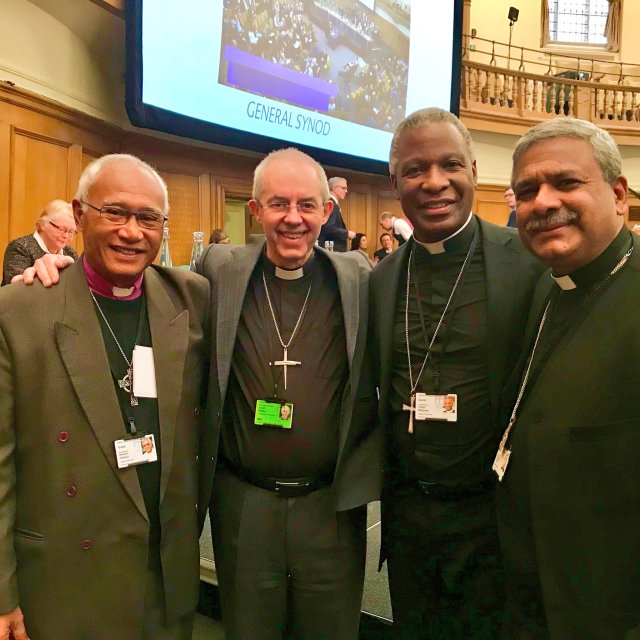
Archbishop Justin with Archbishops (L-R) Winston, Thabo and Humphrey
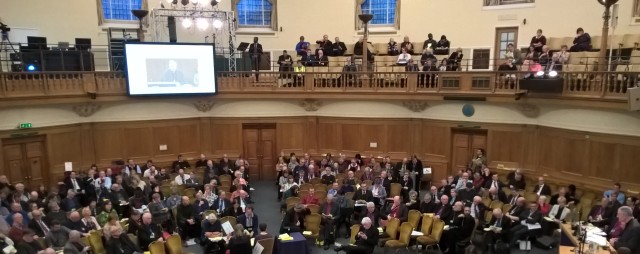
In session: A fairly full house, not too many visitors in the gallery
The Archbishop of Canterbury got two big gigs at Synod today – a homily at the morning Communion service, and then a formal Presidential Address after lunch. Around that we had three stunning guests, some serious debates about moving closer to the Methodist church, some heavy debates about legislative stuff, and some more domestic discussions about food waste. General Synod – all human life is here.
Should robots have holidays?
That was how he began his homily at Communion. He delivered it in the way that any priest would to a gathered congregation, despite the imposing setting. People often cite Leviticus as a classic instance of the irrelevance of the Old Testament, but he gave us an Old Testament masterclass. The passage (Leviticus 25.2-7) is about the Sabbath rest. On the face of it, it’s an instruction about the mechanisms of farming. But it is actually about the kind of people we are, who are tempted to reduce everything to economics. He suggested that:
- as many farmers know in their bones – the land is not ours it is only entrusted to us.
- there are consequences to mistreating it, as on a global scale, the peoples of Polynesia (see below) are finding out with rising sea levels.
That took him to a story that journalists have probably missed, as he talked about the way Brexit offers a challenge to the UK when the Common Agricultural Policy is replaced by something locally-devised. What choices will we make?
Like many good preachers, he returned to the robots he began with, pointing out that while the much-vaunted Artificial Intelligence is both inevitable and wonderful, we cannot do everything with it. Some things require time, love and relationships, such as social care.
All in all it was a clear combination of political-allusive Bible study based in both the Old Testament world and our own times and concerns. You can read it for yourself here.
Change is here to stay
The Presidential Address was something else. It showed us an Archbishop who is hungry for change, in a Biblical tour about coping with change. After his typically self-deferential opening joke, he ran us through the Bible from Leviticus to the Epistles, challenging our attitudes.
He noted
- ‘traditional’ innovation and ‘faithful’ innovation are present throughout the story: through the ages the church has adapted itself without losing the tradition.
- the church has never been without change: the Spirit disrupts stasis and brings change. Even now, the growth in social media means the church cannot live without awareness of the global south Ina way that was once possible.
- one of his favourite phrases, ‘faithful improvisation’ cropped up, which he linked to the call to proclaim the gospel afresh in every generation.
- so, to his listeners’ discomfort, he suggested we have not yet got very far with ‘re-imagining ministry’ – which may explain the speed of the Cathedral Review (see below).
- episcopacy needs to be ‘locally adapted’. This was a bit of a coded message about the Anglican-Methodist item later in the day, when the nature of episcopacy, and our willingness to be flexible about it is a key issue (more ‘faithful improvisation’).
Africa, Oceania, Pakistan
The main event of the morning, for me, was the debate about our partnership links with other world Anglican Churches. We had with us three Anglican Communion guests from three very different places, all in the front-lines of Christian presence and mission.
Archbishop Thabo from Southern Africa brought us down to our proper size by saying that nowadays in his Province, people regard the C of E as our ‘sister church’, rather than always stressing the ‘mother church’ image.
- He got a round of applause for pointing out that Archbishop Sentamu was wearing his dog collar after some years not wearing one ‘while Mugabe was doing his thing’ in Zimbabwe
- He light-heartedly reminded us of a very serious issue as he referred to current water shortage in Cape Town, saying he was glad to be able to take a shower every day while in London.
- The current difficulties in the Communion over ‘new understandings about human sexuality’ got a mention. He stressed that even when relationships break down, hospitality does not.
Lastly he reminded us that the African concept of indaba (much-derided by some after the Lambeth Conference in 2008) has a lot to offer in the current climate. Confirming my suspicions that part of the thinking behind this debate was to gear people up for the pre-Lambeth hospitality programme, he stressed how important the hospitality offered by C of E dioceses to visiting Bishops will be. ‘We belong to each other’
Archbishop Humphrey brought greetings from the under-pressure Church in Pakistan. Speaking without notes, he held us spellbound as he talked about the difficulties they face. ‘They burn our churches’, he said. Yet God in his wisdom is keeping this ‘little Body of Christ’ alive. Regarding terrorism in Pakistan, he reckoned 75-80% of people there, though mostly non-Christian are bruised by it all. ‘They all need someone to wipe their tears and they ask us to pray for them’. Even in Peshawar (where the church was bombed in an atrocity), he said the large mosque congregation ‘has become closer to us’.
Archbishop Winston spoke of the missionaries from the Church of England who, 300 years brought a blessing the peoples of Polynesia – ‘a new way of finding our identity’. As he spoke, images of the church and the Pacific were shown. As rising sea levels threaten island communities, he spoke with urgency about the Paris Agreement of three years ago and the world commitment to curb global temperatures by 1.5 degrees Celsius. Just as the Pacific Ocean cannot exist without the other oceans – it is interconnected – ‘mission is a way of engaging in God’s activity in the world’ and so we can only do God’s activity if we do it together. ‘Together is a secular word for ‘Trinity’, he said.. He didn’t actually get into the US moving away from Paris, but it was pretty obvious that he regards it as critical to the survival of his Oceanic communities.
After that the bathwellschap clapometer broke as there was a standing ovation for all three speakers.
Jammy Dodgers
After that, the Bishop of Guildford opened the debate about partnership links by stating that it was the starting pistol for the pre-Lambeth hospitality programme, which Archbishop Thabo had mentioned. He warned us against the usual glib ‘we gain so much more than they do’ remarks, challenging us to see links as an integral part of our mission, discipleship and even Reform and Renewal. His speech made much reference to the rusty old biscuit tin in his childhood home, which contained both boring old Digestives and also occasional Jammy Dodgers. The latter became something of a meme during the whole debate.

Crumb: Jammy Dodgers went viral
- The Bishop of Lichfield drew on his own two years in Japan to say that people’s vocations would be greatly enhanced by living and working in churches of another culture.
- A Church of England Youth Council rep, Annika Mathews, talked about her time spent in Romania in the context of the welcome (or otherwise) that Romanians working the UK receive.
- We heard many stories of encounter with companion links, both in the developed world and the Global South.
- Bath & Wells own Jenny Humphreys spoke about the pre-Lambeth hospitality programme in 2008: it was very rewarding for everyone taking part – and we had a lot of fun. (I can vouch for that. We did the garden party thing with hundreds of guests; we worshipped in our Cathedral with bishops from Zambia (our link), Australia and Cuba. More importantly, the visitors went out and about in parishes so ordinary church members got some vision of the wider church. This year we have an interesting programme of exchange visits – details here)
Amid all the affirmation and celebration, Jayne Ozanne reminded us that there is an elephant in the room in all this: the divisions over human sexuality. If we accept the value of experiencing other cultures, then she wondered whether groups going to partner dioceses should include LGBT members. For her, a culture change is necessary.
In his usual forceful and entertaining way, the Bishop of Chelmsford reminded us that we cannot choose our companions on the Christian way. In a riposte to Jayne Ozanne, he spoke of many encounter with Christians of different views in Kenya: ‘the product is not agreement, it is love’.
The motion was carried, and I have no doubt that those who were here will go home invigorated as much by the formidable contributions by the three Primates as by the debate itself.
Food, inglorious food
The debate on Food Waste (read the papers here) had drama as Andrew Dotchin broke up a bread roll and threw a portion of it away to make his point. What followed was hampered by the fact that were six detailed amendments to the main motion. It meant that they all had to be disposed of, and although people were very good about not launching into speeches on each one, substantial debate on the main motion was frustratingly brief.
Who would be in favour of food waste? Well, no-one. In the short time we had, we heard plaintive cries about farmers’ anger at putting in huge efforts to grow food, only to see the amount of waste in domestic and retail bins. Food bank tales vied with horror stories of slavish devotion to ‘best before’ dates. The ‘shopping culture’ has led to huge consumption of imported out of season foods. (Declare an interest: I live near Cheddar, whose summer strawberries are fabulous tasting – for the few weeks they are available.)
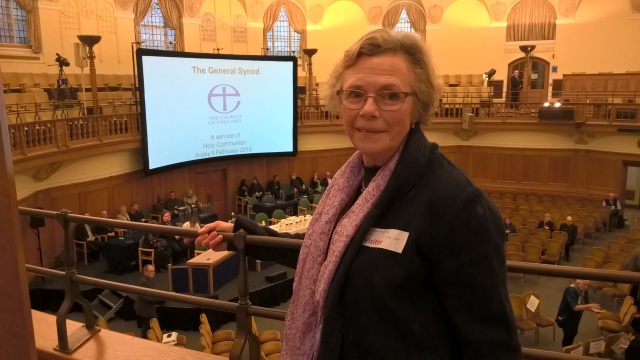
Just visiting: Bath and Wells Lay Chair Mary Masters spent the day up in the gallery
Cathedrals on the fringe
A lunchtime fringe meeting on the Cathedrals Working Group draft report proved very interesting to anyone who visits or who (like me) has some role within the Cathedrals world (I am a Prebendary – i.e.. Honorary Canon – of Wells Cathedral).
The working group has issued a monster report (100 pages) proposing pretty severe reforms to the governance and operation of our Cathedrals. It wasn’t up for debate this time, but Bishop Adrian Newman, the Bishop of Stepney, Chair of the Group, gave a quick run-down of the background at a fringe meeting attended by two dozen or so interested parties. The reasons for convening the groups were
- Visitations to Exeter and Peterborough Cathedral revealing serious governance and financial concerns:
- A Church Commissioners analysis of Cathedral finances showing 13 cathedrals at ‘considerable risk’ in their unrestricted funds
- A planning permission problem at Guildford and financial concerns at Coventry
- The Archbishops Council had therefore commissioned the Group under a tight timeframe.
They are positive about the many good things that happen in and around Cathedral life. But there is a tension between how to deal with the very real governance and finance concerns and destabilising the cathedrals by changing the rules. He described cathedrals as a ‘Russian doll’ of complexity. They have Chapters, Colleges of Canons, Cathedral Councils, but there is no real equivalence to the standard charity model which separates out governance and executive action. The Bishop’s ability to intervene is limited to the ‘nuclear option’ of a Visitation.
Amongst the recommendations:
- Cathedrals should come under Charity Commission oversight, as parish churches do
- Bishops should have a closer role, including appointing a lay vice-chair of Chapter to ensure some outside expertise
- Funding streams should look at rewarding innovation (as now happens with much Commissioners money to parishes), not subsidising decline
- A stronger role for Deans in Chapter
- Significant attention to financial oversight.
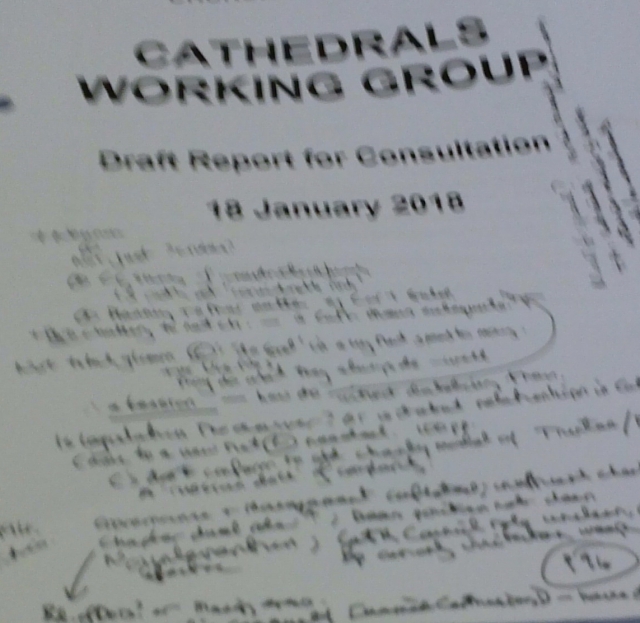
Scribbler: how bathwellschap makes notes in fringe meetings.
My own view is that this is all being done in a hurry.
- The last look at all this was the Howe Report In 1994. This has had doughty defenders in the church press recently by opponents of the new report. In discussion, it became clear that Howe was ’watered down’ in the debating process – the House of Bishops of those days was blamed by some .
- The last look at all this was the Howe Report In 1994. This has had doughty defenders in the church press recently by opponents of the new report. In discussion, it became clear that Howe was ’watered down’ in the debating process – the House of Bishops of those days was blamed by some .
- The group have appealed for their work to be accepted in its entirely, not partially (the shadow of Howe lingers on). They don’t want anyone to amend the recommendations – no cherrypicking. But neither the Archbishops Council nor Synod will react well to being told ‘this is it. Take it or leave it.’
- Why were Residentiary Canons (they were quite grumpy) not consulted during the group’s work? The timescale did not permit it. (An apology was given, but it’s a problem if their only input is going to be the online response now being offered. So they are unlikely to sign up with enthusiasm: it will be interesting when all the Chapters make their formal responses.
A cathedral’s nature is indeed complex: but at heart we must remember they are religious communities, not businesses or (in most cases) parish churches. One gag was that residentiary canons are really just married Carthusians. (If you don’t understand this joke, look up Carthusians. I had to. I can’t make everything lucid and easy…)
Cathedrals have been amongst the least regulated bodies in the Church. Bishop Adrian said the group do not wish them to become the most regulated bodies – but something must be done. There is an online consultation with a questionnaire going on now. You can join in here – you have until the end of this month.
But you do need to actually read the report before you do so!
Connecting with the Connexion
The day ended with a major debate on how we might move on from the Anglican-Methodist Covenant towards some formal recognition of each others’ ministries
This was warm-hearted in the sense that the two invited Methodist speakers (the Revd Gareth Powell, Secretary of Conference, and a former President, the Revd Ruth Gee, Chair of the Darlington District ) were heard not just politely, but with real interest, and the applause was enthusiastic.
The debate on the document setting out the proposals (read it here) was always polite.
- We heard a mix of heartening stories of cooperation and shared ministry, and deep theological reflection both for and against.
- The concept of seeing the Methodist Conference in the form of its President as some sort of episcopacy is, er, adventurous.
- There was much talk of ‘ecclesial anomalies’ – welcomed by some, rejected by others – and the ‘historic episcopate, locally adapted’ that Archbishop Justin spoke of in his homily.
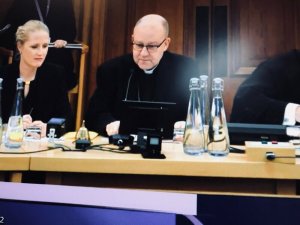
Nunn better: a grabbed shot (not by me) of the Dean of Southwark in the Chair
Andrew Nunn, the Dean of Southwark chaired this tense and busy debate with his usual good humour, with one eye on the clock to try to get the business through by closing time. Off-piste, there are mumblings about this being a bad time to put this through, as there is a perception that the Methodist Church is not in a strong position financially or in numbers: though there is nothing in the paperwork about any financial support being part of any agreement.
Some speakers looked back to the Growing into Union debates of the early 70s (you read it first here in my preview piece) and regretted that we seem to be no further on. Others reckoned that the problems we had then have still not been resolved in this project
Ecclesiological Brexit?
Archbishops can be quite strategic in their timing, and in doing so they can sometimes change the tide of debate. In this case, Archbishop Sentamu interjected in the middle of the debate with a classic bravura encouragement to go and get on with it. Archbishop Justin popped up at the end to say ’though there are still lots of questions if we don’t pass this proposal, nothing will happen’.
- Despite lots of strong hints from the Archbishops, Synod members had too many questions, and thought more work was needed to flesh out the detail of the proposals.
- Despite the excellent mix of heavyweight contributions (Bishops and others on the theology; people from the parishes with strong stories of local shared activity and ministry) there was opposition.
- The Twitter conversations during the debate (with people in the Chamber and out in parishes and theological institutions) were very lively.
- The motion, amended to insist on some more joint theological work, passed in all houses.
Afterwards, someone said to me ‘This is our ecclesiological Brexit’: voting for something without really understanding or thinking through the implications. In my view, tonight’s vote – as so often happens in Synod – was about two different things: the hard detail of the theology, and the warm aspiration to show how much ‘these Christians love one another’. So drawing closer to Methodism is a muddle. But something will eventually happen.
And finally…
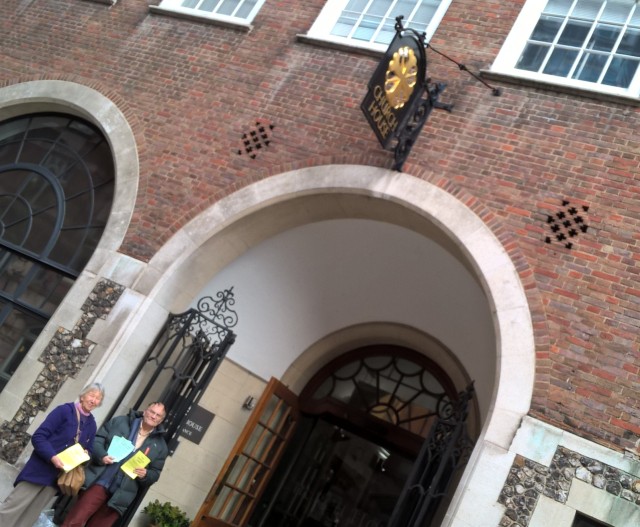
Way in: Church House’s Dean’s Yard entrance
What with jammy dodgers and comparisons with Brexit, it was quite a day. Tomorrow we start off with work on safeguarding, with a number of survivors, claimants and victims, inviting us to stand with them at the Church House entrance and pray with them before we start the day. Many of them will be in the gallery. Your prayers appreciated for all concerned. It won’t be easy for anyone.
You can get my update automatically by clicking the ‘follow’ button higher up this page on the right. Or keep an eye on @bathwellschap or Thinking Anglican, who, as ever, have a good roundup of media coverage and kindly give me a mention.
=======================================================
* Move in a little closer, baby, Harmony Grass, 1969. Hideous, awful song, recorded also that year in a much better version by Mama Cass. No I’m not going to give a link to it. If you must, find it yourself.

Pingback: Law and religion round-up – 11th February | Law & Religion UK
always good to get this regular, accessible and human report from the corridors of power (sic)
Pingback: Off we went, to make a great big tent, on the weekend * | bathwellschap